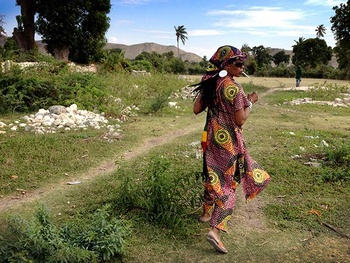The new season at La Maison de la Création gets off to a fine rhythmic start with the visit of Chouk Bwa Libète, who will introduce us to Haitian voodoo music. Prepare yourself for a musical – but also spiritual – experience to mark the cultural centre’s tenth birthday.
“Chouk Bwa” means tree stump, a reference to the words of Toussaint Louverture, the leader of the Haitian Revolution in the late 18th century, as he prepared to face exile in France: “By overthrowing me, they have only felled the trunk of the tree of liberty in Saint-Domingue, but it will grow again, because its roots are deep and numerous”. So Chouk Bwa Libète are, in a sense, the roots of liberty. “We chose that name because, via music, we fight for the freedom of our people,” explains Sambaton (Jean-Claude Dorvil) on the telephone from Gonaïves, a key centre of voodoo in Haiti.
After the devastating earthquake of 2010, the country gradually got back on its feet, but, in the words of Sambaton, “everything’s fine, except for politics. The people hope to find work some day. Lots of people have no purchasing power and without purchasing power you don’t exist. Because even to go to a hospital when you have a sick child, you need money... The reconstruction of the country is hypocrisy. The people in power are thriving at the expense of the poor.” The way Sambaton sees it, “freedom, today, means access to education, to health, to work for everyone.” That’s the message he tries to get across through his music, mizik rasin, a Haitian genre that emerged in the late 1980s, drawing inspiration from both traditional Haitian – especially voodoo – rhythms and foreign influences such as reggae and world music. Their songs express both the sufferings and the indefatigable life force of the Haitian people. “We sing for the improvement of the situation of the street children, the neglected, the poor, those who have no voice – it is for them that we sing.”
Chouk Bwa Libète: the voice of the voiceless

Mention voodoo and people straightaway think of Haiti. This kind of music is the Caribbean island’s most important cultural representative, but it is much more than that: “Voodoo is ritual music, a religion that comes from our African ancestors. We are the heirs to the Dahomey of Benin and to Vodun culture.” The Kingdom of Dahomey was an ancient African kingdom located in the south-west of what is now Benin. Many slaves from that region were taken to the French colony of Saint-Domingue, now known as Haiti.
Chouk Bwa Libète is made up of four percussionists, two female dancers, and its leader and composer Sambaton on vocals and on the fer (an iron bar), a sort of bell that announces the different rhythms to call up the spirits. “We have lots of rhythms and a total of nine drums. We are working on an album, which will come out in 2014 and from which we will present nine pieces in Brussels. It is still a spiritual experience. I spend a day or two preparing in advance, to get into contact with the spirits we will adopt.”
CHOUK BWA LIBÈTE 18/1, 20.00, €5/9, Centre Culturel Bruxelles Nord/Maison de la Création, Oud Gemeentehuis/Ancien Hôtel Communal, place E. Bockstaelplein, Laken/Laeken, 02-424.16.00, www.maisondelacreation.org
Chouk Bwa Libète is made up of four percussionists, two female dancers, and its leader and composer Sambaton on vocals and on the fer (an iron bar), a sort of bell that announces the different rhythms to call up the spirits. “We have lots of rhythms and a total of nine drums. We are working on an album, which will come out in 2014 and from which we will present nine pieces in Brussels. It is still a spiritual experience. I spend a day or two preparing in advance, to get into contact with the spirits we will adopt.”
CHOUK BWA LIBÈTE 18/1, 20.00, €5/9, Centre Culturel Bruxelles Nord/Maison de la Création, Oud Gemeentehuis/Ancien Hôtel Communal, place E. Bockstaelplein, Laken/Laeken, 02-424.16.00, www.maisondelacreation.org
Read more about: Muziek
Fijn dat je wil reageren. Wie reageert, gaat akkoord met onze huisregels. Hoe reageren via Disqus? Een woordje uitleg.